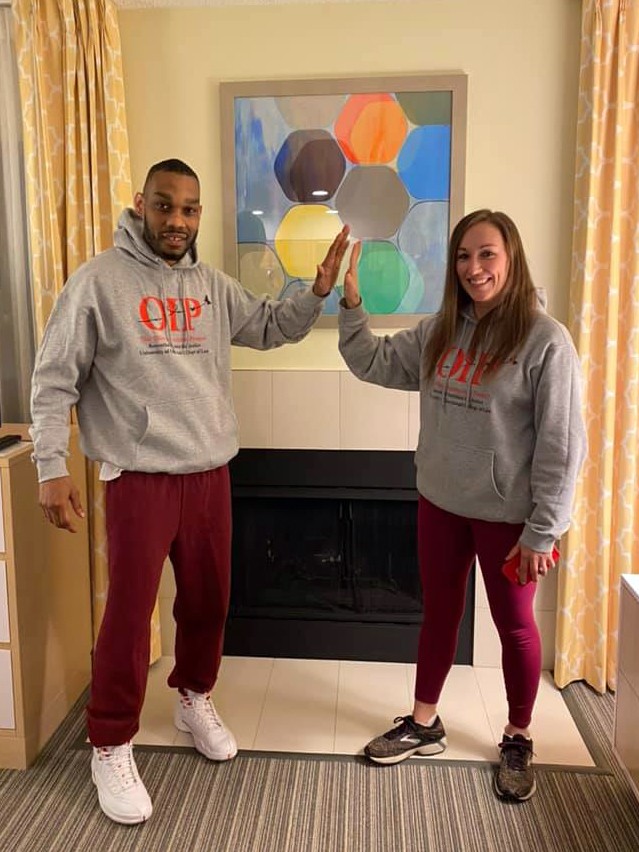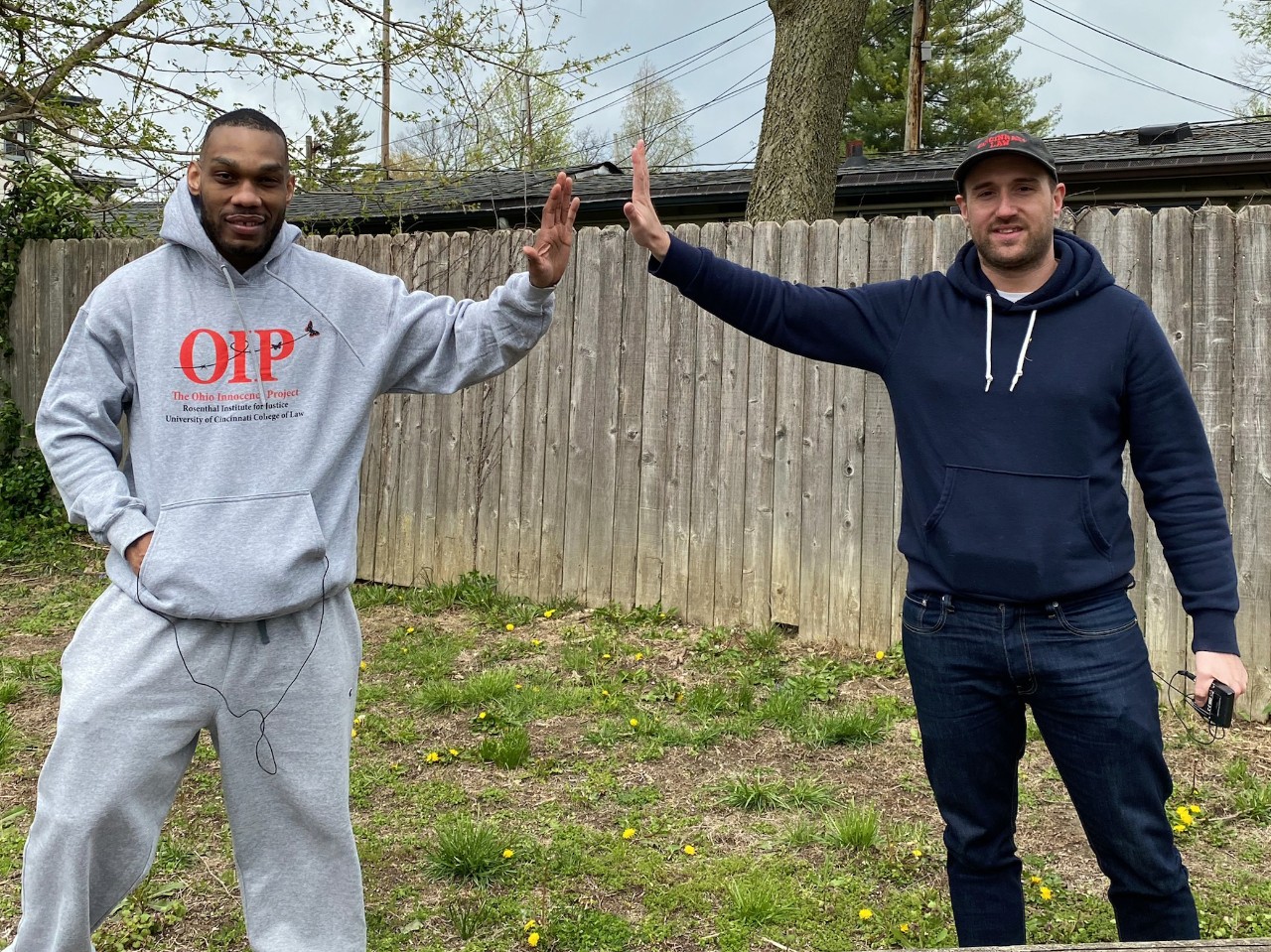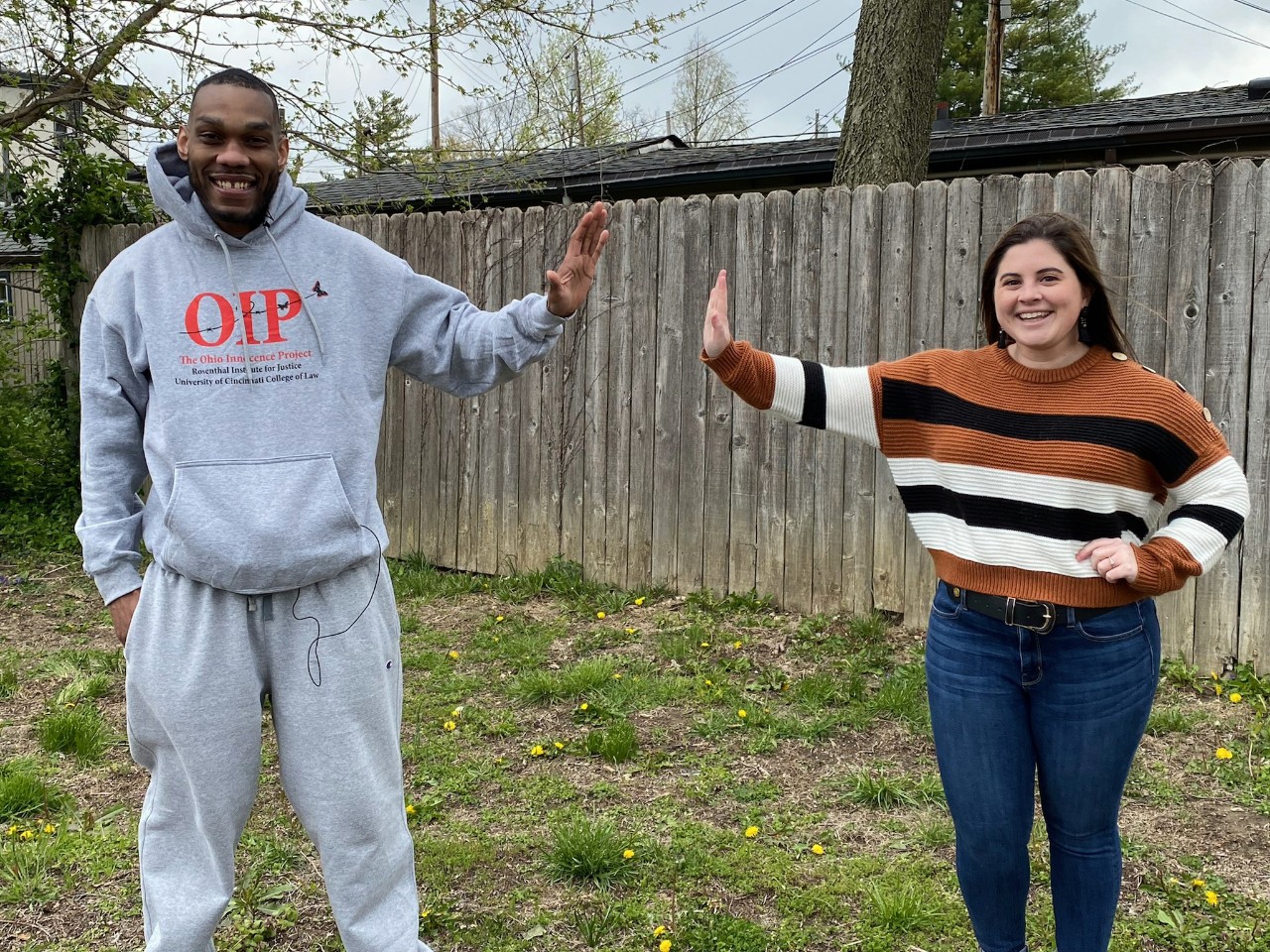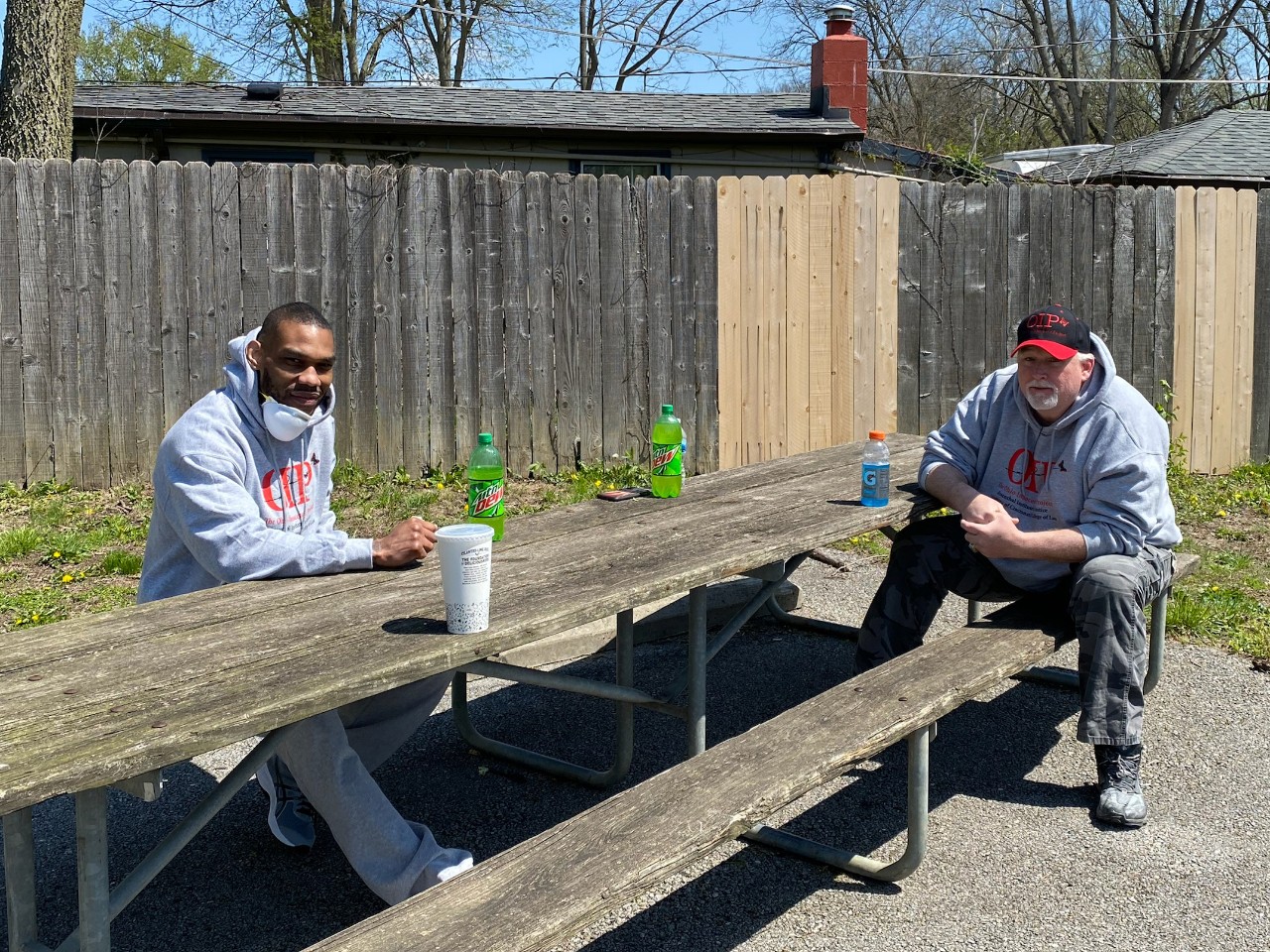
UC’s OIP helps free 29th defendant
Christopher Smith is free after 12 years in prison and a COVID-19 scare
After languishing in prison for 12 years for a crime in which DNA evidence implicated another perpetrator, Christopher Smith walked free on April 14 with help from University of Cincinnati law students, professors and attorneys.
The Ohio Innocence Project (OIP) at the UC College of Law, took up the case of the Cincinnati man convicted in 2008 of armed robbery and sentenced to 18 years in prison. Michele Berry Godsey, a 2006 UC College of Law alumnus and former OIP participant, represented Smith both at his original trial in Hamilton County 12 years ago and in his appeal.

Christopher Smith celebrates his release at a safe social distance with attorney Michele Berry Godsey, a UC College of Law alumnus and former OIP participant. Berry Godsey represented Smith at his original trial 12 years ago and represented him in his appeal. That Smith and his attorney are both wearing similar colors is a coincidence, Berry Godsey said laughingly. Photo provided/Mark Godsey
OIP Director Mark Godsey, who served as co-counsel on the case, is used to the wheels of justice moving slowly, but in Smith’s case they ground excruciatingly slow.
Berry Godsey, with recent help from UC students and faculty, has fought a more than decade-long legal battle over DNA evidence withheld at Smith’s trial that implicates another man committed the crime.
The perpetrator wore a disguise — a wig, sunglasses and a mask found near the getaway vehicle used in the robbery. Smith’s DNA wasn’t detected on the wig and sunglasses.
However, despite Berry Godsey’s repeated requests made before and during Smith’s trial both in writing and orally, Smith’s defense didn’t receive the full DNA evidence conducted by the lab.
That evidence wasn’t obtained until several months after Smith’s conviction, and it pointed to a different culprit.
Smith appealed on various constitutional violations. In June 2019, the 6th Circuit Court of Appeals ruled in Smith’s favor and sent the case back to the lower court to resolve final issues.

Chris Smith celebrates his newfound freedom from a safe social distance with UC College of Law student and OIP fellow Matthew Doktor, who worked on his case. Provided/Mark Godsey
Justice blocked despite COVID-19 scare
On April 9, U.S. District Court Judge Timothy S. Black overturned Smith’s conviction and issued an order calling for him to be “immediately” released. Smith and his attorneys thought his path to freedom finally appeared to be on the fast track.
Instead, he lingered in a jail cell for five more days in what his attorneys call a “federal-state standoff” amid the novel coronavirus outbreak.
Despite the federal order calling for his release, Smith’s attorneys say various officials defied the order by continuing to hold him in custody, first at the Toledo Correctional Institution, where he’d been serving his sentence, and then at the Hamilton County Justice Center in Cincinnati.

Chris Smith celebrates his newfound freedom from a safe social distance with UC College of Law student and OIP fellow Kaylee Price, who worked on his case. Provided/Mark Godsey
The stalemate, Smith’s attorneys say, increased Smith’s risk for "serious medical complications or death from the coronavirus." Smith, 38, suffers from hypertension, a chronic condition brought on by stress from his years of incarceration, according to court documents. Those with high blood pressure appear to be at a higher risk of dying from COVID-19, according to the Centers for Disease Control and Prevention.
“[The state] has cared more about hiding its misconduct than justice and now even more than the sanctity of human health and life in an unprecedented pandemic,” Berry Godsey wrote in court documents.
“One would think by the state’s actions that Mr. Smith is Osama bin Laden or Lee Harvey Oswald, and the state feels compelled to ignore federal orders out of an emergency need to protect unprecedented national security interests,” she continued. “This is a bizarre case for the state to have doubled-down and ignited a standoff with the federal judiciary. It is also bewildering, shameful and heartbreaking.”

Christopher Smith chats from a safe social distance with fellow Ohio Innocence Project exoneree and Board of Advocates member Dean Gillispie after his release from prison this week. Gillispie served 20 years in prison for crimes he did not commit before he was exonerated of the crimes and released from prison, thanks to the OIP. Photo provided/Mark Godsey
Smith finally walks free
On April 14, a Hamilton County Court of Common Pleas judge also issued an order for Smith’s release. That same day, federal judge Black issued yet another order calling for Smith’s immediate release. Anyone who didn’t comply, Black sharply warned, would be held in contempt of court.
Officials released Smith later that evening. He appeared stunned by his newfound freedom, said Berry Godsey, who noted that Smith, who shows no symptoms of COVID-19, will self-quarantine for 14 days before rejoining the community.
“He started crying,” said Berry Godsey. “He embraced his son for a really long time. He called his daughter who was only seven months old when he got locked up; she wept when she heard his voice. As they were on the phone, a bus drove by, and he said to her, ‘Do you hear that? That was a city bus driving by, because I’m outside, free.’”
For Berry Godsey, who waged a tireless battle to free Smith, the culmination of that journey was also incredibly poignant.
“I’m so thankful that I got to walk out the doors to freedom with him,” she said. “ It was beautiful. Heartbreaking that we couldn’t hug because of the coronavirus, but beautiful, still.”
Smith is the 29th person freed with the help of the OIP. Combined, the 29 defendants have served more than 540 years in prison for crimes they did not commit.
About the Ohio Innocence Project
The Ohio Innocence Project (OIP) at the University of Cincinnati College of Law — Ohio’s only law school-based innocence organization — is one of the most well-known and successful of its kind in the nation. Since its launch in 2003, the OIP has helped free 29 wrongfully convicted inmates who've collectively served nearly more than 540 years in prison. Read more about the OIP's latest exonerations below.
26: Ru-El Sailor released from prison after 15 years
27: UC proves innocence of Christopher Miller
28: Charles Jackson walks free after serving 27 years for murder
Read more about the OIP's earlier exonerees here.
Featured image at top: Christopher Smith celebrates his release from the Hamilton County Justice Center on April 14, 2020, from a safe social distance with attorney Michele Berry Godsey, a UC College of Law alumnus and former OIP participant. Smith served 12 years in prison for an armed robbery that DNA evidence later implicated a different perpetrator. Photo/provided/Mark Godsey
Impact Lives Here
The University of Cincinnati is leading public urban universities into a new era of innovation and impact. Our faculty, staff and students are saving lives, changing outcomes and bending the future in our city's direction. Next Lives Here.
Stay up on all UC's COVID-19 stories, read more #UCtheGood content, or take a UC virtual visit and begin picturing yourself at an institution that inspires incredible stories.
Related Stories
UC celebrates record spring class of 2025
May 2, 2025
UC recognized a record spring class of 2025 at commencement at Fifth Third Arena.
UC students recognized as outstanding peer career coaches
May 1, 2025
Two University of Cincinnati students are recognized for outstanding contributions to the Bearcat Promise Career Studio in the 2024-2025 academic year.
UC students recognized for achievement in real-world learning
May 1, 2025
Three undergraduate University of Cincinnati Arts and Sciences students are honored for outstanding achievement in cooperative education at the close of the 2024-2025 school year.
